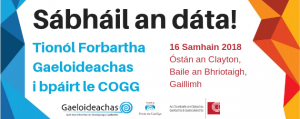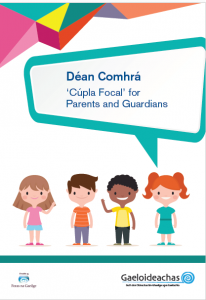(Gaeilge) An bhfuil scoil nua le hoscailt i do cheantar in 2019?
December 18, 2018
(Gaeilge) Deis deiridh clárú do Thionól Forbartha 2018 – dornán spásanna fágtha!
November 6, 2018
Exhibition Stands and Advertising at our annual conference
September 17, 2018
Click here for information and applications.

Déan Comhrá ‘Cúpla Focal’ for Parents and Guardians
August 27, 2018
Gaeloideachas is delighted to announce the publication of its new booklet Déan Comhrá ‘Cúpla Focal’ for Parents and Guardians.
This booklet is aimed at parents and guardians of children attending a naíonra or Irish-medium school. It is full of simple, practical vocabulary that can be used at home together on a daily basis. We hope the booklet will help parents find useful phrases and words to use with their children at home while doing homework, having meals together and as part of their daily activities, with the múinteoir or príomhoide and with other parents they meet at the naíonra or school.
There are many benefits of speaking Irish at home with your child and we hope that these words and phrases will help make Irish part of your daily routine. You can help your child build on their confidence and improve their Irish by giving them lots of opportunities to speak Irish outside of the classroom. It will help them greatly to have regular, real reasons for using the language. If they see that you are enthusiastic and positive about the language, they will be too! If you wish to learn Irish yourself, we highly recommended that you use this booklet
alongside our website IrishforParents.ie. You will find many excellent resources on the site which have been specifically developed for the language requirements of parents and guardians of children in Irish-medium education. The website will help you build vocabulary based on relevant topics, help your understanding of spoken
Irish through video and audio files and you can learn more about language structures. We hope you have fun on this journey together. Bain triail as!
Have a read here! Déan Comhrá ‘Cúpla Focal’ for Parents and Guardians
(Gaeilge) Tosú sa Ghaelscoil – cúpla nod don tuismitheoir le Gaeilge
August 27, 2018
Starting in the Gaelscoil – tips for parents
August 27, 2018
Starting school is a big milestone for small children. There’s loads of great information out there on how to prepare your child for their first day in school, but what if it’s their (and your) first experience of a Gaelscoil?
Here are five tips especially for parents who have little or no Irish themselves, to help you and your child feel ready for their céad lá sa Ghaelscoil.
Be enthusiastic: Show your child that you’re excited about them starting in the Gaelscoil. Enrolling them in the school was a big decision for you, especially if you don’t have fluent Irish yourself. Read up on the benefits of education through Irish and remind yourself why you chose the school for them. Browse the section for parents on www.gaeloideachas.ie, which is a one-stop-shop for everything to do with gaelscoileanna.
Talk together: Talking to your child in any language helps them to improve their communication skills. It’s how we learn to talk in the first place, and it’s how they’ll learn to speak Irish when they start in the Gaelscoil, by listening to their teachers and then imitating them.
Talk to your child about all the great things that will happen when they start school school: making new friends, playing games, reading new books, singing songs and learning a whole new language. Give them the chance to tell you what they’re looking forward to or what they might be worried about.
Talk to them about the language or languages you use at home, and explain to them that they will use Irish in school. Help your child to understand that there are different languages. From the age of about 2, children can tell the difference between colours and shapes, and they begin to develop an awareness of the differences between people. Talk to them about how language is one of the ways in which people can be different, and that this can be fun and exciting. Use examples that will be familiar to your child if you can, friends and neighbours who speak other languages, or any experiences they have of other countries and cultures. Try watching some cartoons in Irish together. There’s a huge range of programmes and interactive games in Irish available on www.cula4.com, TG4’s player for children’s television.
Introducing some Irish to your home before your child starts in school will help them to get used to how the language sounds, and even to learn a few simple words. Gaeloideachas has published a book of simple vocabulary and phrases to help parents to use some Irish at home. It covers various everyday themes: home life, school, animals, colours, clothes, and lots more besides. It’s available to download from www.gaeloideachas.ie. You can listen to how the words are pronounced through the online dictionary www.focloir.ie.
Read together: The very best thing you can do for your child to prepare them for school is to read to them, and foster a love of books and reading. Picture books are a great way to encourage conversation – about school or anything else. Read in your home language, or if you have a cúpla focal, try reading a simple book in Irish with them. Make an adventure of it, take a trip to the library together and allow your child to choose a book for you to read.
Learn together: The vast majority of parents whose children go to a Gaelscoil don’t have fluent Irish. Show your child that you’re interested in learning along with them and they’ll be motivated to teach you. There’s no better teacher than the child who comes home from school every day, excited to share what they’ve learned. Take a look at www.irishforparents.ie. This website has simple lessons to help you to learn Irish yourself at home, as well as a number to call when you need help with your child’s homework. Ask your school about classes for parents. Many schools offer them at low cost and convenient times throughout the school year. These classes give you a great chance to talk to other parents about their experiences and to trade tips on how best to support your child.
Don’t worry! It’s natural to be anxious about your child starting school, even more so when they’ll be learning through a language that you’re not fluent in yourself. But don’t forget that the teachers, special needs assistants and all the support staff in Gaelscoileanna welcome new children in every year. It’s their job to take the very best care of your child, and to help them to settle and feel happy in school. They have all kinds of tricks up their sleeves to do this – songs, body language, gestures, pictures, rhymes, repetition –to make sure that the children can understand them and that they can understand the children. It won’t be long before your child will start using the Irish they pick up in school, and they’ll be keen to teach you as they learn themselves.
Tutor wanted for student with Dyslexia
August 3, 2018
Bilingual (English/Irish) Tutor sought for 7 year old boy with Dyslexia entering Rang 1 in September.
Please contact Ciara in Dublin 6 at 087 204 6565 .
(Gaeilge) Folúntas le Gaeloideachas
June 22, 2018
(Gaeilge) Líofacht sa Ghaeilge á cheadú mar chritéir iontrála sna scoileanna lán-Ghaeilge sa Bhille Oideachais 2016
May 10, 2018
First ever public event for parents of children with speech, language and communication needs in a bilingual school.
May 1, 2018
Press Release: For immediate publication
01.05.2018
A growing number of children in Ireland grow up speaking two or more languages in the home or within the school environment. Many parents/guardians have questions, often unanswered, surrounding the use of two languages and also the suitability of bilingual education for children with speech, language and communication difficulties, and with other special educational needs (including autism, dyslexia, dyspraxia and Down Syndrome). Leading experts in this field will address these issues at a public information evening and will seek to reassure parents that bilingual education is a beneficial system of education for children with varying special educational needs.
This event, organised by Gaeloideachas in partnership with the Irish Research Network in Childhood Bilingualism and Multilingualism will take place in Trinity College Dublin on the 3rd of May 2018 between 7-9pm and is open to all.
Education through the medium of Irish in Ireland, and other forms of bilingual education, is a hugely beneficial system that offers many advantages to children, including communicative, literacy and fluency in two languages, greater confidence and sense of identity, cognitive and increased educational attainment. These advantages are available to all children, including those with special educational needs. Unfortunately, however, there are many misunderstandings and myths surrounding these questions that lead to children being excluded from a potentially advantageous form of education.
Perspectives on questions surrounding Irish-medium and Gaeltacht education will be shared by leading experts in the field including: Professor Ianthi Tsimpli (University of Cambridge); Professor Padraig Ó Duibhir (Dublin City University); Dr Ciara O’Toole (University College Cork); Dr Maria Garraffa (Heriot-Watt University) & Clodagh Ní Mhaoilchiaráin, (Principal of Gaelscoil Bhaile Brigín – an Irish-medium school with two ASD units).
Parents, prospective parents, researchers, teachers and professional practitioners are welcome to attend. Please register for this free event by following this link:
CONTACT:
Bláthnaid ní Ghréacháin, Gaeloideachas 086 8050335
Francesca La Morgia, Irish Research Network in Childhood Bilingualism and Multilingualism: 0892504137





